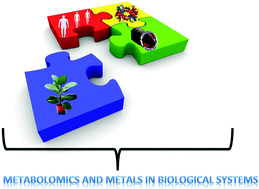The use of metabolomics in the study of metals in biological systems
Abstract
Metabolomics may be defined as the comprehensive quantitative and/or qualitative analysis of all metabolites present in a bio-fluid, cell, tissue, or organism. It is essentially the study of biochemical phenotypes (or metabotypes). Metabolic profiles are context dependent, and vary in response to a variety of factors including environment and environmental stimuli, health status, disease and a myriad of other factors; as such, metabolomics has been applied to a wide range of fields and has been increasingly utilised to the study of the roles played by metals in a range of biological systems as well as, encouragingly, in understanding the underlying biochemical mechanisms. The role of metals (and metalloids) in biological organisms is complex and the majority of studies in this area have been performed in plants but the fields of natural product chemistry, human health and even bacterial corrosion of water distribution systems have been investigated using this technique. In this review some of the novel approaches in which the metabolomics toolbox has been used to unravel the roles of metals and metalloids in a range of biological systems are discussed and suggestions made for future research.


 Please wait while we load your content...
Please wait while we load your content...